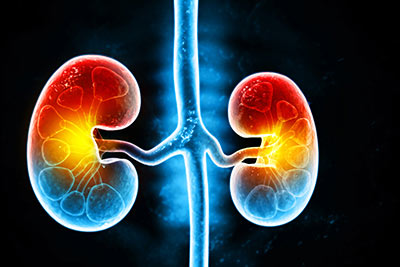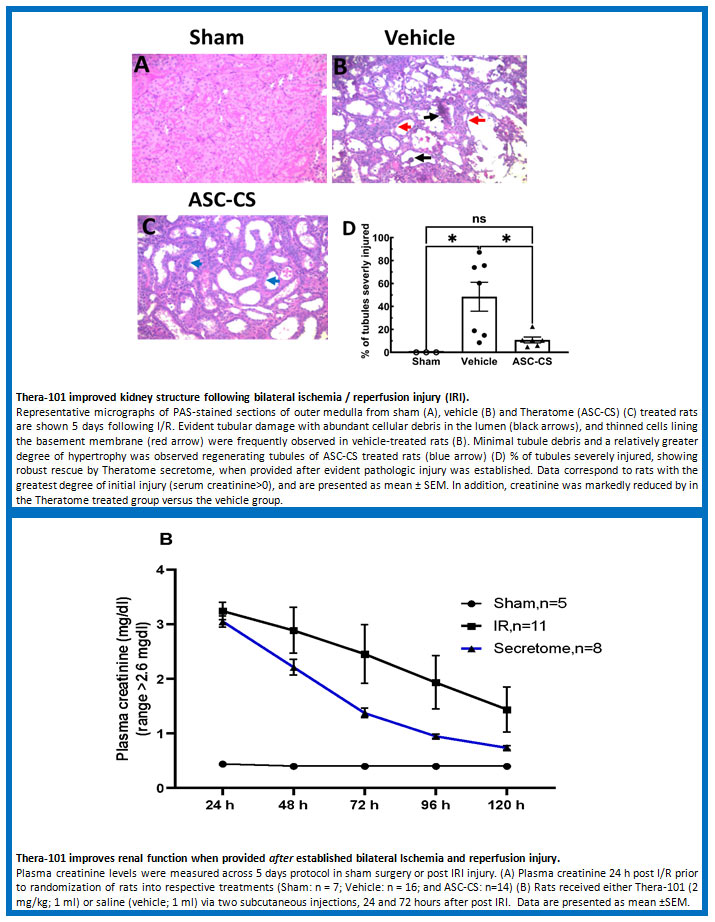Kidney Failure
Background
Acute Kidney Injury (AKI) is a syndrome characterized by a sudden loss of renal function associated with tubular injury, inflammation, and impaired renal blood flow. The leading causes of AKI include ischemia reperfusion injury (IRI), frequently occurring secondary to cardiopulmonary bypass surgery or transplant, sepsis, or exposure to nephrotoxic agents. In addition, AKI is associated with progression of chronic kidney disease and end- stage renal disease, which is thought to result from inefficient tubular repair, sustained inflammation, and hypoxia due to capillary rarefaction.
AKI remains a major therapeutic challenge and economic burden to the health care system. It is estimated that up to one in five seriously ill hospitalized patients may develop AKI and this is associated with a 20-25% mortality rate and an increased hospitalization cost estimated between $5.4 to $24 billion USD. For example, in the United States, approximately 22.4% of the end stage kidney disease cases come from Medicare beneficiaries with a history of hospital acquired AKI. The economic burden of kidney failure includes direct medical costs associated with dialysis treatments, kidney transplantation, medications, and hospitalizations. Additionally, indirect costs arise from reduced productivity, disability, and the impact on the quality of life. In 2017, Medicare spending on ESRD reached $35.4 billion, representing a significant portion of healthcare expenditure. (Source: National Kidney Foundation)
Solution
Secretomes hold significant promise for the treatment of AKI and thus reducing kidney failure. By potentially enhancing patients quality of life, decreasing hospitalizations and associated costs, and reducing mortality rates, this approach will offer a valuable new therapy to treat this deadly disease. The development of Thera-101 for this very critical need has been supported by the National Institutes of Health through an SBIR, which led to extension of our seminal finding that Thera-101 could protect kidneys from injury, to now even more exciting discovery that Thera-101 administration could rescue kidneys from injury when administered the day after the injury, after the renal failure has already set in and is clinically recognized.
As shown below, Thera-101 ameliorates kidney tubular damage due to ischemia and reperfusion, thus reducing the elevation in plasma creatinine levels that occurs following this insult to the kidneys (also shown below). A creatinine test measures kidney function by assessing their efficiency in filtering waste from the blood. Creatinine, a by-product of energy-producing processes in muscles, is filtered by healthy kidneys and excreted as a waste product in urine; thus, elevated creatinine levels are indicative of kidney failure or disease. Importantly, the effect of Thera- 101 to treat kidneys is seen even when the dose is administered on the day following the kidney injury. This finding is of great clinical relevance, since patients would appropriately be treated after their injury is evident. Thera-101 is accordingly a unique targeted therapy, which is effective when provided at a clinically meaningful time. Through the use of Secretome, Theratome aims to revolutionize the approach to managing AKI and related renal diseases, offering patients a more effective treatment and, ultimately, a better prognosis.

